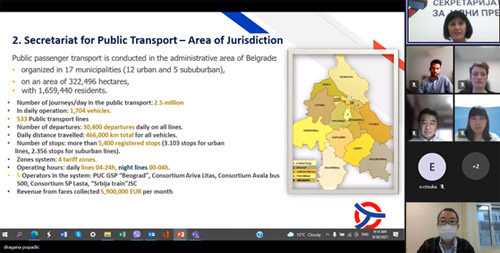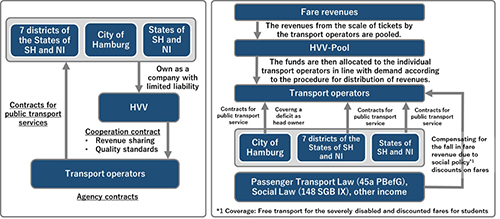- Home
- Technical Cooperation Projects
- Index of Countries
- Europe
- Serbia
- Project for Modernization of Public Urban Transport in the City of Belgrade
- Project News
- Joint Online Session on Public Transport between the City of Belgrade, Serbia and the City of Hamburg, Germany
Project News
2021-10-01
Joint Online Session on Public Transport between the City of Belgrade, Serbia and the City of Hamburg, Germany
In the Project for the Modernization of Public Urban Transport in the City of Belgrade (the project), the scope of work includes a technical visit and in-country training sessions in Hamburg, Germany.
Prior to the training in Hamburg, which is being rescheduled due to the global outbreak of the COVID-19, an online session was held on 30th September in collaboration with the City of Hamburg, with the aim of improving the operation of public transport in Belgrade at an early stage and providing the participants with a deeper understanding of the respective public transport systems in both cities.
[Participating organizations]
- City of Belgrade: Secretariat for Public Transport (SfPT)
- City of Hamburg: Hafen-Dampfschifffahrt AG Sea-tourism and Ferry service (HADAG) and Hamburger Hochbahn AG (HHA)
- Japan: JICA and JICA Project Team
 Screenshot of the session
Screenshot of the session
[Overview of the session]
At the beginning of the session, an overview of the project was presented, followed by an overview of the challenges in respect of public transport management in both cities, and future initiatives being planned.
[The state of public transport in the Hamburg metropolitan area]
- In the Hamburg metropolitan area (consisting of the city of Hamburg, the four districts of the state of Schleswig-Holstein (SH) and the three districts of the state of Lower Saxony (NI)), the Hamburger Verkehrsverbund (HVV) has been operating public transportation based on the unified fare system in the region, as a pioneer of the unified fare system since 1967. The introduction of a unified fare system and ticket types, as well as a controlled timetable, has greatly improved not only the efficiency of the service, but also the convenience for passengers.
- The HVV has a relationship with the municipalities of the Hamburg metropolitan area and the transport operators, as shown in Figures 2 and 3, and comprehensively operates and manages the various public transport services operated by the member operators, and comprising suburban railways, urban subways, buses and ferries.
 Figure 1: Division of roles and contractual relationships among municipalities,
Figure 1: Division of roles and contractual relationships among municipalities,
HVV and transport operators (Source: HVV (external link))
Figure 2: Flow of funds related to HVV
(Source: HVV (external link) and Japan Municipal Research Center (external link) (Japanese))
- As an overarching objective to guide their actions, HVV has set future goals of 1. Multimodal transport using ICT and 2. Zero emission of greenhouse gases. As a concrete approach to the goal, by combining the journey-planning application "hvv switch" and a mobility-sharing service with existing public transport, HVV aims to go beyond being a transport service provide that only takes users from their point of origin to their destination, but also includes facilitate the user experience by facilitating route searches, reservation and payment as a single service (MaaS). In conjunction, HVV is actively making the transition to electric and hydrogen vehicles in their vehicles to achieve zero emissions in the transport sector.
As mentioned above, the online session provided many lessons learned on measures that should be considered in the future to improve public transport management in Belgrade, based on initiatives in the Hamburg metropolitan area. The project will continue to conduct more detailed lectures and site visits through the training in Hamburg to reflect the knowledge gained in improving the public transport management in Belgrade.
At a later stage of the project, additional training sessions will take place in three other European cities after the training in Hamburg.
- About JICA
- News & Features
- Countries & Regions
- Our Work
- Thematic Issues
- Types of Assistance
- Partnerships with Other Development Partners
- Climate Change / Environmental and Social Considerations
- Evaluations
- Compliance and Anti-corruption
- Science and Technology Cooperation on Global Issues
- Research
- JICA Development Studies Program / JICA Chair
- Support for the Acceptance of Foreign HRs / Multicultural and Inclusive Community
- Publications
- Investor Relations
